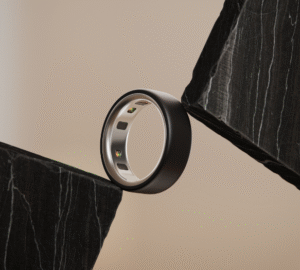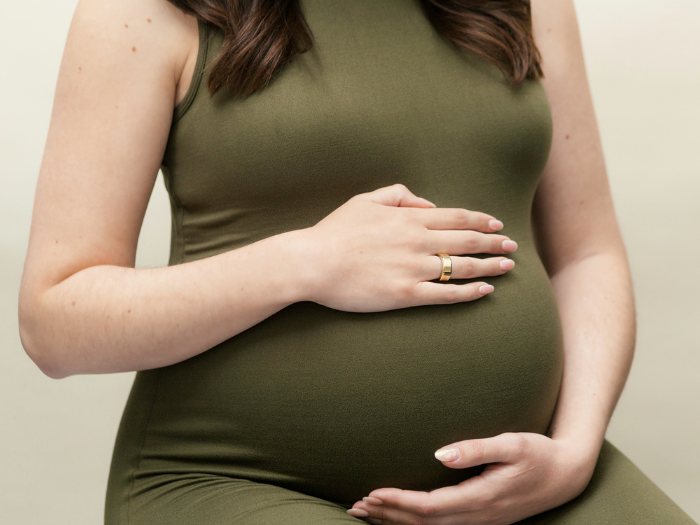Pregnancy can be a joyous experience, but it can be stressful as well. While some stress is to be expected, extreme or unmanageable amounts can increase the risk of complications for the mother and baby, ranging from preterm birth to postpartum depression.
In pursuit of discovering accessible ways to help pregnant women lower their stress levels, researchers from San Diego State University and University of California, Irvine conducted a month-long trial using the meditation app Headspace and the health-tracking device Oura.
Pregnant participants (N=20) were asked to complete twice-daily meditations, and changes in their subsequent stress were measured using Oura data and self-reported surveys. Participants reported a significant reduction in anxiety, in addition to other benefits – learn more below.
Read the full study here.
READ MORE: Oura & Headspace Partner to Provide Members With 15 In-App Audio Sessions
| Member Tip: Oura members now have access to Headspace meditations directly on the Oura App. |
Stress During Pregnancy: What’s the Issue?
Unregulated stress has negative physical and mental health outcomes across the board. But during pregnancy in particular, stress and anxiety can have more serious consequences, impacting the mother and baby in both the short and long term.
For instance, 54% of women who experienced stress during pregnancy gave birth prematurely. Additionally, studies have shown that high levels of maternal stress extend into childhood and adolescence, increasing the risk of attention deficit hyperactivity disorder (ADHD) and reducing cognitive performance.
Unfortunately, prenatal stress and anxiety are common: 25 to 50% of women experience anxiety during pregnancy, and 1 in 5 pregnant women meet the criteria for an anxiety disorder.
Lowering stress during pregnancy can be difficult, particularly when barriers to entry are high for many stress management tools. That’s why the researchers decided to use Headspace, an accessible, app-based meditation tool. Meditation has been shown to lower stress and improve various health markers as a result.
| Member Tip: Oura members now have access to Pregnancy Insights, when you opt in during pregnancy, you can access guidance and support about your pregnancy directly on the Oura App. |
READ MORE: How to Use Pregnancy Insights
Tracking Stress with Heart Rate Variability (HRV)
Heart rate variability (HRV) is considered a physiological marker of stress. Higher HRV is linked to better resilience to stress, while lower or less stable HRV is associated with higher stress.
Using Oura, the researchers tracked physiological stress by looking at this metric. In addition, Oura provided a comprehensive understanding of other physiological changes that may occur as a result of the intervention.
LEARN MORE: HRV and Stress: What HRV Can Tell You About Your Mental Health
Study Design
The longitudinal study enrolled 20 pregnant women, who met certain inclusion criteria. Once enrolled, the participants were instructed to wear an Oura Ring for 4 days to get a baseline measure of their HRV.
Starting the month-long intervention, participants followed two meditations per day on the app Headspace. First, the participants were told to follow meditations in the “Basics” category, which lasted between 3 to 20 minutes. Then, they followed 30 meditations in the “Pregnancy” course, lasting between 10 to 20 minutes. In total, the intervention amounted to 60 meditations, lasting 530 to 1050 minutes (~9-18 hours).
In addition to following guided meditations, the women completed surveys to establish their level of social support, their baseline anxiety and stress, and to identify any potential confounders, like excessive caffeine (which can impact HRV) or an increase in exercise regularity (which can skew results).
Using Oura Ring, data was collected on their HRV, resting heart rate, body temperature, and sleep and then analyzed to discover the presence of any statistically significant correlations.
Key Findings
After data analysis was complete, the study found that participants experienced the following after the one-month intervention:
- A significant reduction in general anxiety and pregnancy anxiety.
- A 2% improvement in average Sleep Score.
- 65% of participants reported sleeping better overall.
- 9 participants increased their exercise regularity, 6 of whom were participants who reported an improvement in their sleep quality – indicating a possible link between sleep quality and energy levels or healthy behaviors.
- 19 out of 20 participants reported that meditation helped with other aspects of their lives, including: improved patience, perspective, focus, conflict management, reduced emotional reactivity, and a greater focus on self-care.
- Overall, HRV did not improve. However, 1 out of the 6 HRV metrics (the low-frequency power band, relating to sympathetic activity) improved by 13%.
READ MORE: Can Oura Ring Help Predict Symptoms of Depression & Anxiety?
Limitations
- Type of study: Longitudinal studies are observational studies that identify correlations between variables over time. While this is useful, it cannot establish causality between two variables or account for the effect of confounding factors. In this case, HRV was expected to improve as a result of the intervention to signify stress reduction. However, it’s difficult to account for the impact of pregnancy on HRV when there is no control group.
- Study size: The study is small, with just 20 participants. The larger the sample size, the more robust and generalizable the findings.
- Demographic of participants: Based on those who applied for and met the study criteria, the demographics of the participants were 70% white, 90% college educated, 75% married, and 70% worked full time. This is not reflective of the population at large, limiting the external validity.
Stress Management During Pregnancy: What’s Next?
The study found that it’s possible to lower stress levels during pregnancy using app-based stress management tools. Headspace is arguably more accessible than other types of relaxation activities, like yoga classes, due to the cost, time commitment, and flexibility in location.
Tracking your biometrics during pregnancy can inform your habits. Oura makes it easy to monitor changes in your stress levels (through the Daytime Stress feature and HRV), or your sleep. This allows you to make targeted changes, and to see the impact of these changes on important health metrics. For instance, you can use the Tags feature to track when you practice a stress-reduction tool like meditation, and then compare your data on the Trends view to see the effects.
This study signifies promising developments in women’s health, offering more accessible ways for women to combat stress during pregnancy by leveraging modern technology like Headspace and Oura.
| Member Story: Tracking her sleep and biometrics on Oura empowered Oura member Kathleen to prioritize self-care during her pregnancy. |
Read the full study here.
RELATED: New Research Uses Oura to Predict If Labor Will Start Before or After Due Date











